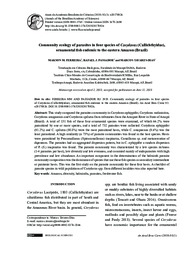Community ecology of parasites in four species of Corydoras (Callichthyidae), ornamental fish endemic to the eastern Amazon (Brazil).
Community ecology of parasites in four species of Corydoras (Callichthyidae), ornamental fish endemic to the eastern Amazon (Brazil).
Author(s): FERREIRA, M. M.; PASSADOR, R. J.; TAVARES-DIAS, M.
Summary: This study compared the parasites community in Corydoras ephippifer, Corydoras melanistius, Corydoras amapaensis and Corydoras spilurus from tributaries from the Amapari River in State of Amapá (Brazil). A total of 151 fish of these four ornamental species were examined, of which 66.2% were parasitized by one or more species, and a total of 732 parasites were collected. Corydoras ephippifer (91.2%) and C. spilurus (98.8%) were the most parasitized hosts, while C. amapaensis (9.6%) was the least parasitized. A high similarity (approximately equals 75%) of parasite communities was found in the host species. Hosts were parasitized by Procamallanus (Spirocamallanus) inopinatus, Camallanus sp. and metacercariae of digeneans. The parasites had an aggregated dispersion pattern, but in C. ephippifer a random dispersion of P. (S.) inopinatus was found. The parasite community was characterized by a low species richness (1-4 parasites per host), low diversity and low evenness, and consisted mainly of endoparasites with high prevalence and low abundance. An important component in the determination of the helminth parasite community composition was the dominance of species that use these fish species as secondary intermediate or paratenic hosts. This was the first study on the parasite community for these four hosts. A checklist of parasite species in wild populations of Corydoras spp. from different localities was also reported here.
Publication year: 2019
Types of publication: Journal article
Unit: Embrapa Amapá
Keywords: Diversidade, Diversity, Freshwater fish, Parasites, Parasito de Animal, Peixe de Água Doce
Observation
Some of Embrapa's publications are published as ePub files. To read them, use or download one of the following free software options to your computer or mobile device. Android: Google Play Books; IOS: iBooks; Windows and Linux: Calibre.
Access other publications
Access the Agricultural Research Database (BDPA) to consult Embrapa's full library collection and records.
Visit Embrapa Bookstore to purchase books and other publications sold by Embrapa.

